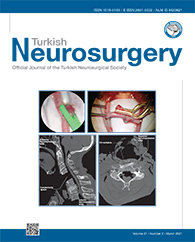2Medicana International Hospital, Department of Neurological Surgery, Istanbul, Turkey
3Memorial Bahcelievler Hospital, Department of Neurological Surgery, Istanbul, Turkey
4Hacettepe University School of Medicine, Department of Biophysics, Ankara, Turkey
5Hacettepe University, Department of Nanotechnology, Ankara, Turkey
6Hacettepe University School of Medicine, Department of Histology, Ankara, Turkey
7Hacettepe University School of Medicine, Department of Stem Cell Research Center, Ankara, Turkey DOI : 10.5137/1019-5149.JTN.29489-20.5 AIM: To examine the implantation of chitosan channels stuffed with mesenchyme-originated stem/progenitor cells (MSPCs) derived from adult rats in a spinal cord transection model. The level of axonal regeneration, the effect of chitosan channels on the survival of MSPCs, and the functional recovery results were also evaluated.
MATERIAL and METHODS: Chitosan channels stuffed with MSPCs were implanted at the level of T8 in a transected rat spinal cord. MSPCs were harvested from the pelvic bone marrow of adult rats, and the MSPC?chitosan channel group was compared with three control groups. The axonal regeneration capacity, the effect of chitosan channels on the survival of MSPCs, and the functional recovery results were compared among four groups. The survival of MSPCs was evaluated using histopathological techniques and electron microscopy, axonal regeneration/germination was evaluated by confocal microscopy, and locomotor function was assessed for 4 weeks using the Basso, Beattie, and Bresnahan locomotor score.
RESULTS: The MSPC?chitosan channel group exhibited enhanced survival of transplanted MSPCs compared with MSPCs transplanted directly into the lesion cavity, although no significant difference was detected in locomotor function between the treatment and control groups. The MSPC?chitosan channel group demonstrated thicker myelination of axons than the other groups.
CONCLUSION: Chitosan channels promoted the survival of transplanted MSPCs and created a tissue bridge after complete spinal cord transection. They also induced axonal regeneration and germination. No significant improvement in functional recovery was found between the groups.
Keywords : Mesenchyme-originated stem/progenitor cells, Axonal regeneration, Chitosan channel, Complete spinal cord transection




